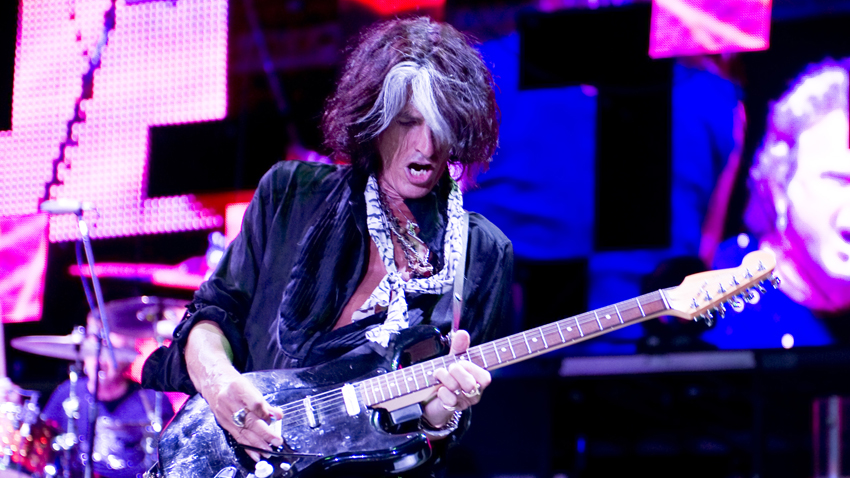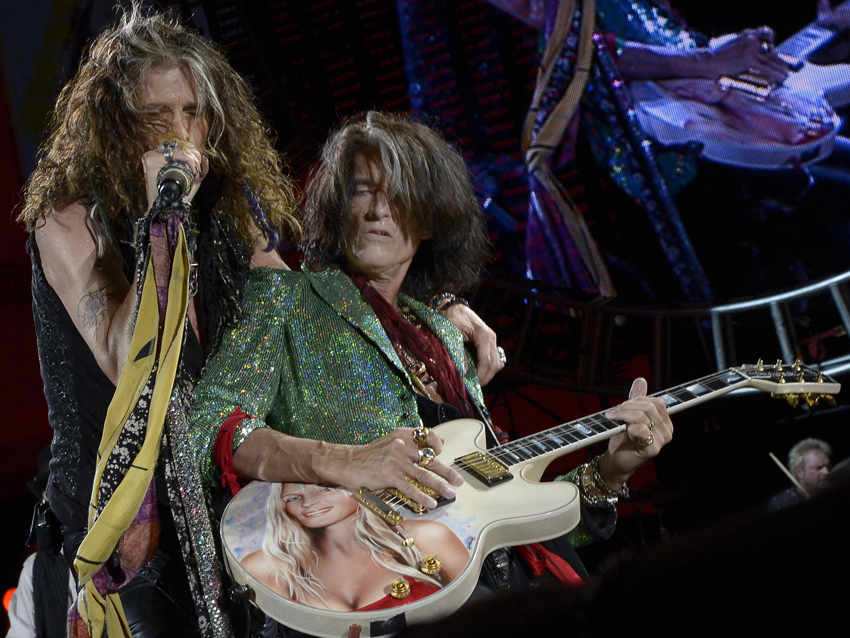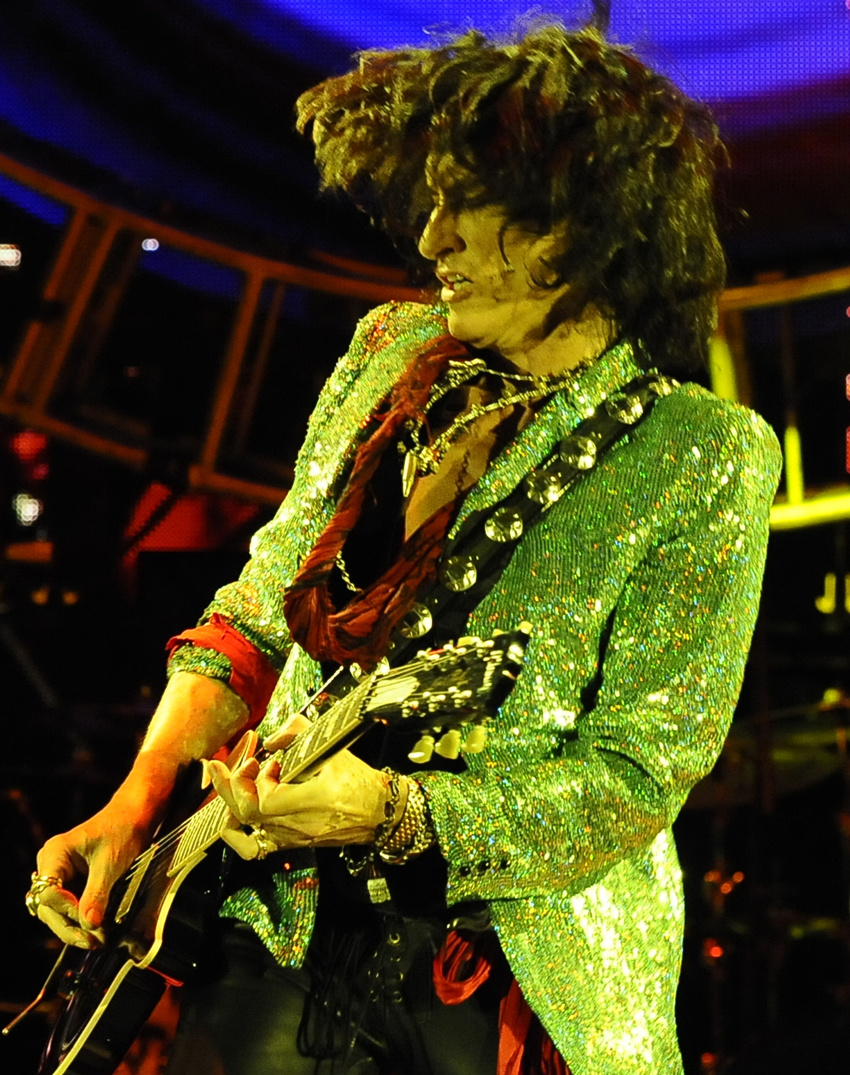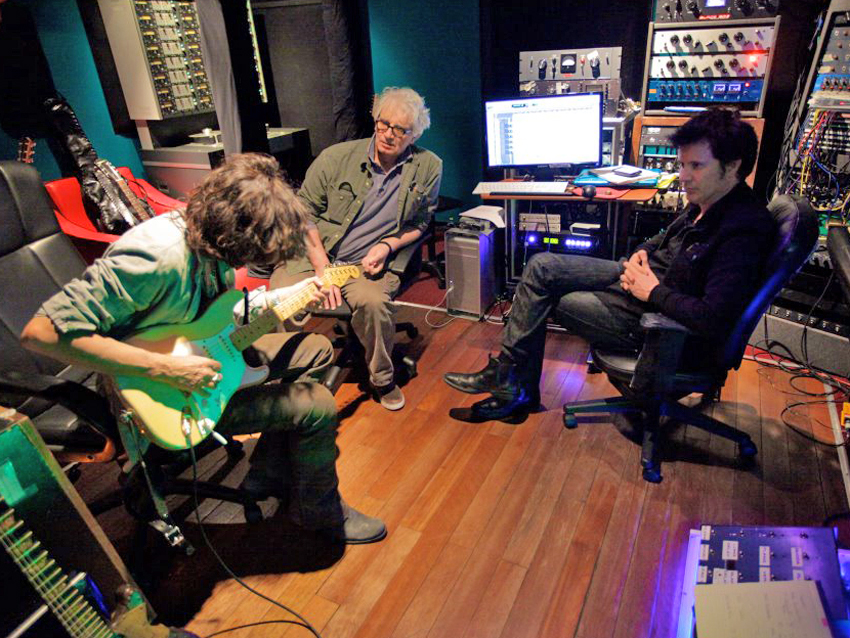
With the recent release of Music From Another Dimension!, Aerosmith have finally ended the longest gap between albums of all-original material in their 40-plus-year career. The wait for new music surely tested the patience of the veteran Boston band's fans, and the dry period wasn't any easier on guitarist Joe Perry, either. "I was going fucking crazy," he says.
The past 10 years have been turbulent for the members of Aerosmith. There were medical issues (a knee replacement for Perry, a head injury for guitarist Brad Whitford and rehab for singer Steven Tyler) and the usual band squabbles, but it all came close to a full-scale implosion in 2010 following Tyler's "brand Tyler" reincarnation and his subsequent role as celebrity judge on American Idol.
Gradually, fences were mended, and the group (which also includes bassist Tom Hamilton and drummer Joey Kramer) re-teamed with producer Jack Douglas, boardsman for classics such as Toys In The Attic And Rocks, for the new set. "In the end, we got to do something that was really important for this record," Perry says. "We all got in the room with Jack and played without the pressure of having to write. We uncovered the rock that we had been standing on for years. It was no small amount of effort, believe me."
Clocking in at almost 68 minutes, Music From Another Dimension! offers something for every Aerosmith fan: there's feral riff animals (LUV XXX, Out Go The Lights, Lover Alot), big-time power ballads (We All Fall Down, Can't Stop Lovin' You), a couple of Perry-sung grinders (Something, Freedom Fighter) and even a pair of winking references to the ghosts of Aerosmith past (Sweet Jesus, Legendary Child). Flying in the face of standard operating procedure for recording in 2012, the band tracked the album to tape, utilizing multiple CLASP (Closed Loop Analog Signal Processor) units in a variety of studios.
The fullness of analog sound is but one of the topics we spoke with Perry about. The guitarist called MusicRadar from a tour stop in Austin, Texas, to talk about the recording of the new record, the guitars he used and whether it will take another 11 years before the next disc.
How essential was CLASP in presenting - or preserving, really - the authentic sound of Aerosmith on record?
"I think, so far, it's come as close as anyone has to making it work. Pro Tools has gotten to the point where it spits out what you put in, and if you're not careful, you're going to get a tinny, thin-sounding record. People have tried various ways to work around it - you use analog gear going in, analog gear going out, and then, of course, you're mixing down to tape. There's lots of tricks.
Want all the hottest music and gear news, reviews, deals, features and more, direct to your inbox? Sign up here.
"It was just a matter of somebody coming up with a way of getting your Studer to lock up with Pro Tools, and so that's what CLASP does. I always thought, Well, that's one way of getting the sound of tape - go to tape first and then go to Pro Tools."

On stage with Tyler at the Hollywood Bowl, 2012. Perry plays his Gibson "Billie" BB King Lucille model. Gene Blevins/ZUMA Press/Corbis
You recorded the bulk of the album with Jack Douglas, but that wasn't always the plan: several years ago, the band made a couple of attempts with Brendan O'Brien.
"Yeah. We were touring and working through these last 10 years, and Brendan came up a few times. He has a way of working that's good for some bands, but it just didn't click with us. He was a big help to me when I recorded my last solo record. I borrowed one of his engineers, and I went down to Atlanta to check out his studio.
"But with the band and him, it just didn't click. And I don't think we were ready; we didn't have the material. Not everybody was on the same page at that point. It was hard for him to get something to hold on to and help us with."
What is it about the combination of Aerosmith and Jack Douglas that works so well?
"He gets it. He knows that the strength of the band is found in us playing together. That's the thing: We're a band, and what happens with us is all about bouncing things off each other and everything else that a band does. Whether you're a mariachi band or a jazz quartet or whatever, you're still a band.
"The kind of music we make is meant to entertain and excite people - we hope. [Laughs] That's always the goal. That's why we put it all together. Jack tries to stay out of the way of all that stuff. In a way, he's transparent. He's not interested in having his name under ours as a songwriter. Some producers are like, 'Well, I'll help you write songs, blah blah blah… ' So what Jack is interested in is getting the energy of the band on tape and pushing us to the next level, which for a good 20 years was bypassed.
"There's been a wealth of material that the other guys came up with. You add up a couple of Brad songs, a couple of Tom songs, a couple of songs that I wrote, a couple that Steven wrote and then the songs that Steven and I wrote together - that's a great well of creativity. I think we started working with the outside writers for various reasons, mostly to take some of the pressure off. But also, after working with Steven for so long, it was good to get some fresh input, you know?"
Did the band and Jack ever use albums such as Rocks or Toys In The Attic as reference points? Not so much for sound, but spirit.
"No. Definitely not. You know, it's a funny thing - people say to us, 'Well, why doesn't the band write new stuff that sounds like the old stuff?' But when you really get down to it, a lot of the people who come to our shows aren't that interested in hearing any more new music from us. It's an interesting thing. The more we go through this and become more classic rock, the more people identify with these songs and hook up with them.
"I tweeted something a while ago on tour, during the last leg, and I said, 'We're thinking of playing one new song from the record. Would you like to hear a rocker or a ballad?' And I got back tweets that said things like, 'Well, what songs are you going to have to take out of the set?'
"That put things pretty much into perspective right there. It's not that they don't want to hear the new stuff. They know they're going to get the record, and they know that the time will come when they get to hear it live maybe. But they want to hear things like Movin' Out or Hangman Jury - stuff that's been seasoned, stuff that's part of the Aerosmith thing. Fortunately, we have a pretty big catalogue. It's going to be interesting over the next couple of weeks to see how people respond to some of the new stuff."
How did you like working with Warren Huart as engineer?
"Oh, he was great. We both have a real interest in history - he loves anything to do with flying. He's hot shit, you know? Being a guitar player, he gets it. When you're talking about some of those things that are hard to put into words, he knows what you mean. Describing certain sounds, there's a common language that guitar players have. He always had his Teles sitting there, so if there was ever a weird chord that I could play but couldn't name, he could pick it out."
As we all know, you have a lot of guitars -
"A lot." [Laughs]
"But were there a couple of guitars - or a particular guitar-and-amp combination - you found yourself relying on during tracking sessions?
"On this record, for the real icing on the cake kind of stuff, I used an Epiphone semi-hollowbody with mini humbuckers and a short scale neck. For some reason, that thing just rocked. It had so much bite and tone and clarity. I basically used a Vox AC15, one of those hand-wired ones, and there was also an old Fender, I think it's a Bandmaster, with three 10-inch speakers. So it was a combination of those two and then also going directly into the board.
"We were going direct partly for the sake of having it, just in case we had to re-amp, which we ended up not having to do. I would say that the majority of the sound came from the amps."

At the Hollywood Bowl, 2012, with a Joe Perry signature model prototype. The guitar features a Gibson Les Paul Axcess-style body. © Gene Blevins/ZUMA Press/Corbis
The song Oh Yeah has a cool, greasy guitar sound - and it does have a bit of a classic Rocks aura about it.
"That was a funny thing, because I originally wrote it to have the lyrics wrapped around more of a funky vibe. Not just the beat - the whole vibe was going to be a funky thing with a different kind of riff. So I cut it like that as a demo, intending to sing it myself, but I wasn't really happy with it. It kind of sat there a while. So when we cut the basics with the band on it, we cut it like a rock song. That's when I got even more disillusioned, because it sounded… I don't know, it just wasn't happening for me.
"Steven kept pushing for it because he liked the lyrics. Then, when we put the horns on it and the chicks singing on it, it really came into its own. I was still planning on singing it, and then Steven said, 'Maybe we should do it as a duet.' Jack was saying, 'You should give Steven a shot at singing it.' And I was like, 'Hey, man, it's my song!'
"I was talking it over with my wife, Billie, and she said, 'Look, if he likes the lyrics that much, let him sing it. Give him a shot.' So I said, 'Maybe we'll do a duet, and he'll sing the chorus' - that kind of thing. Finally, he just went in there and belted it out. For that song, I just couldn't deny it. It really turned into an Aerosmith song."
The guitar solo on Out Go The Lights is very snarky and full of bite, but it's not really overdriven. The sound is almost clean.
"Yeah. Brad and I go at it different ways. I really like being able to hear the tone of the guitar. He's really getting some incredible tones out of his Les Pauls, in the studio and live, and they match up real well with the kind of tone that I like. One of the best guitars I have is the Billie guitar. It's semi-hollow, and I can just plug it into an amp and get such chime and ring - even on stage.
"The guitar came together by chance. I wanted something that was a piece of art, and it turned out to be this really rockin'-sounding guitar. I've always loved that shape and the feel of a guitar that size, especially for rhythm playing. It's a great all-around guitar. So that's a good example of that clean kind of sound."
Lover Alot is underpinned by a growling, rolling rhythm guitar. The sound is so low, almost guttural.
"Yeah, that's the baritone. That song is going over live; the band's playing it like a steamroller. It's one of the new songs we put in the set, and we're having good fun playing it."

Perry lays down an overdub at Swing House Studios while producer Jack Douglas (center) and engineer Warren Huart (right) look on.
For the album, you worked at the band's studio, Pandora's Box; at your own studio, the Boneyard; at Warren's studio, Swing House, in LA; and a few other places, all over a lengthy period of time. Did you ever want to just go to one place and bang it out in two weeks?
"A lot of it had to do with the timing of the record and working around Steven's schedule on American Idol. That's why we were in LA, which was a great thing - I probably wrote more stuff in the five months we were there than in the two years on my own. All of our friends in the business are out there. Living in Boston, we never get to see them. They'd drop in at the studio, and it was all really good.
"The process of making this record - working with Jack and laying down the basics - it could have been done in two months if we didn't have a tour in the middle of it, and what with the Christmas holidays and Steven doing American Idol. But it's basically the same process: the basics are done, Steven and I get in the studio with Jack, we start putting the vocals on, put the guitars on, and then a couple of the guys come in to put solos on and overdubs. It's pretty much the average for an Aerosmith record."
I'm curious: What about Brad's guitar work blows your mind on the record? Are there some parts that he plays that really stand out to you?
"Probably on the song Closer - the solo is just great. And you know… [pauses] I still have trouble keeping them straight [laughs]. He definitely shines on this record and has been playing great. The best part is how we work together. It should sound like one guy, you know what I mean?"
And it does. Sometimes it's hard to tell who's playing what.
"That's what a good band should be about. Obviously, when somebody wants to step out, that should be apparent. But for the most part, we're there to move the song along. That's the deal."
After the long wait for this record, I would imagine you don't want to go 11 years before the next one.
"Well, yeah. [Laughs] We're hoping to do a world tour next year, and then we'll start thinking about the next one. But that's why we put a lot of material on this one, because we knew that it would be a while."
Joe is a freelance journalist who has, over the past few decades, interviewed hundreds of guitarists for Guitar World, Guitar Player, MusicRadar and Classic Rock. He is also a former editor of Guitar World, contributing writer for Guitar Aficionado and VP of A&R for Island Records. He’s an enthusiastic guitarist, but he’s nowhere near the likes of the people he interviews. Surprisingly, his skills are more suited to the drums. If you need a drummer for your Beatles tribute band, look him up.
